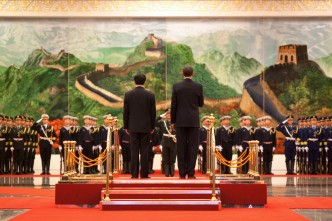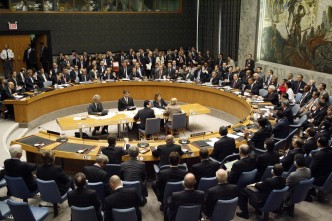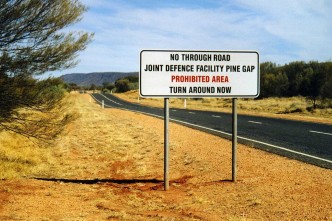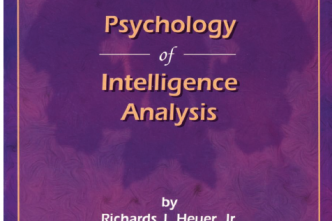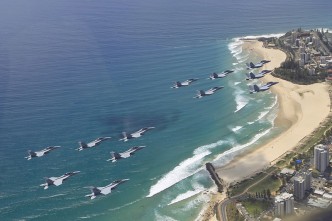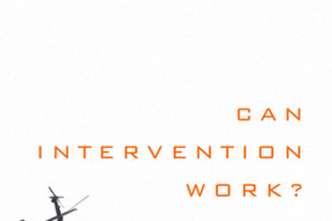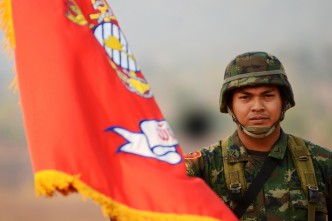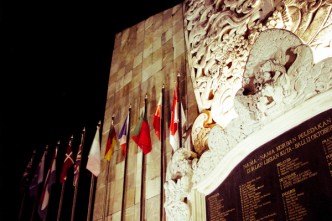Coral Bell’s recent passing has created an unfillable void in the Australian International Relations and Strategic Studies scene. Yet Coral leaves behind a wealth of ideas generated during her illustrious career that retain substantial currency …
In a recent post, Peter Jennings and I argued that if Australia won a seat at the global decision making peak body, the UN Security Council, we’d benefit from picking some signature issues where Australia …
Cam Hawker’s recent Strategist post, ‘Stuck in the middle with you’, suffers from five major fallacies. First, it assumes that Australia–US joint facilities predetermine the strategic relationship between Canberra and Washington. Second, it assumes that …
I’m currently attending the Australian American Leadership Dialogue in Honolulu, the fifth such meeting to be held in Hawaii as part of the now 20 year-old venerable Australian American Leadership Dialogue process. It’s an interesting …
Australia has less room to maneuver in balancing between Washington and Beijing than many analysts suppose. Much of the commentary on Australia’s management of its relationships with the United States and China is framed around …
For your (virtual) bookshelf: Psychology of Intelligence Analysis, Richards J. Heuer, Centre for the Study of Intelligence, Central Intelligence Agency, 1999. In the 1990s, the CIA commissioned a study on the nature of intelligence analysis to …
Welcome back for our weekly round-up of articles, reports and events in the strategy, defence and security world. Articles and news What is the biggest security problem in today’s world? This Foreign Policy article discusses five of …
It was hard not to crack a wry smile when reading Tobias Feakin’s post on the Budapest Conference on Cyberspace. Let’s just say that the position of the blocs settling behind a more ‘rules-based’ approach, …
The recent Australian National Audit Office reports on the current and future air combat capability highlighted the risk and potential cost of keeping the 1980s vintage Hornets flying until they are replaced by the F-35 …
Dennis Richardson is preparing to leave the Department of Foreign Affairs and Trade to join Defence as its new Secretary, and he’ll be the twelfth person to hold that job since Sir Arthur Tange created …
Back in 1970, Time magazine ran an article entitled ‘Toward the Japanese Century’. More recently, in 2005 Mark Leonard was writing about the ‘European Century’. Today you’d be hard pressed to find anyone who’d envisage …
We will know around Friday afternoon whether Australia has been successful in winning its bid for a non-permanent seat on the UN Security Council. Having just returned from a trip to New York, the vibe …
We saw yesterday how the misinterpreted ‘lessons’ of international interventionism from the Bosnia experience led to the notion of ‘liberal imperialism’ that ultimately came unstuck in Iraq, only to be (somewhat) saved by a ‘surge’ …
In the globalised, interdependent world in which we live our modern lives, the keystone that keeps much of our economies, infrastructures, lines of communication, defence, security, intelligence and social capital enabled is the cyber domain. …
Throughout the last twenty years, foreign interventions have been staged in the Balkans, East Timor, Afghanistan, and Iraq. Each time convoys of diplomats, consultants, contractors, and aid workers arrive hard on the military’s tracks. Pursuing …
After my most recent trip to Thailand, I began to reflect upon the parallels in security between Thailand and Australia. It seems to me that Thailand faces a similar conundrum to Australia: its principal security …
Here’s our regular round-up of articles and analyses on the latest developments in strategy, defence and international security as well as upcoming events. First for today is Rohan Gunaratna at RSIS whose latest commentary looks …
Senator David Johnston, the Shadow Minister for Defence, spoke at an ASPI lunch yesterday. His speech was titled ‘The politics of defence’, but its main theme was why defence shouldn’t be political. Along the way, …
As we approach the tenth anniversary of the Bali bombing, there’ll be remembrance ceremonies, personal reflections, and the entirely justified acknowledgments of the successful law enforcement and security cooperation that emerged since 2002. But there …
The rise of India has been trumpeted by analysts and scholars for over a decade. Dietmar Rothermund’s India the rise of an Asian giant, Mira Kamdar’s Planet India, Edward Luce’s In spite of the gods: …


